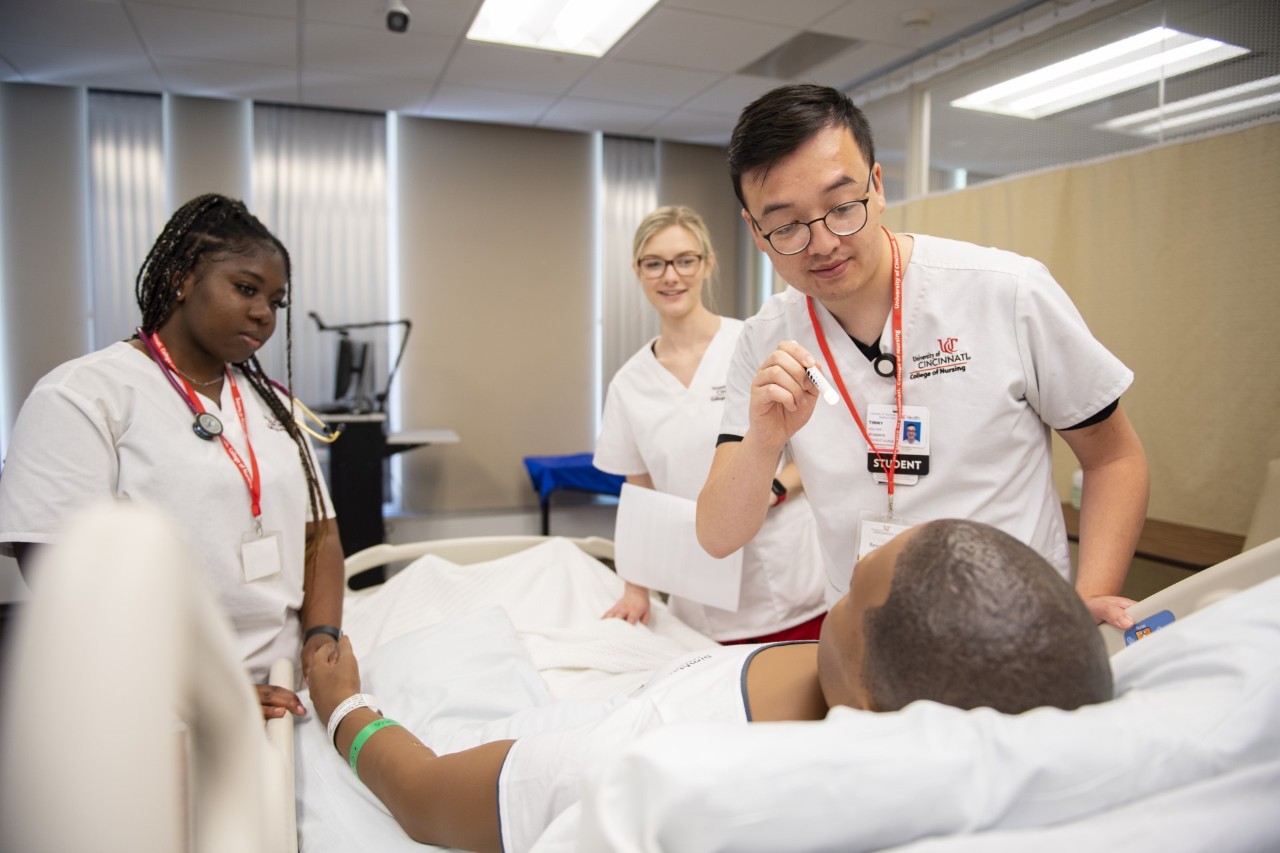
Does ‘belongingness’ matter in the health professions?
UC’s professor-student research team aims to find out
Hannah Lauck hopes to someday become an anesthesiologist specializing in pediatrics.
The third-year medical sciences major at the University of Cincinnati has already got a taste of working in a medical environment thanks to her part-time work at local hospitals and medical offices as a pharmacy technician, medical assistant, patient registration representative and neonatal intensive care unit volunteer.
Lauck says she now has a better understanding of the “hierarchy of medicine” and how it might impact students like herself who are just beginning their journey in a health profession career. In this system, medical titles and responsibilities change and they reflect progressively more experience and education.
This hierarchy is partly a result of trying to ensure patients are getting competent and quality care, but it can also produce an environment where students don’t feel empowered to ask questions or voice observations and that could in some instances impact patient care, says Lauck.
“As you increase with education you move higher up within the hierarchy,” says Lauck. “So for someone who is entry level or in a student position, you are pretty much at the bottom of the scale. That’s not necessarily a bad thing, but you’re definitely worried about stepping on toes and want to give a great first impression.”
“Sometimes people are deterred by that hierarchy, they feel like they can’t say their opinion about patient outcomes because they’re worried about overstepping,” says Lauck. “If you have a viewpoint that differs from someone higher up in the hierarchy you should be confident and secure enough and feel as if you can speak up.”

Hannah Lauck/Photo provided.
Lauck’s experience made her a valued co-author on a recent paper titled "Transforming Students Into Healthcare Professionals: A Literature Review Exploring the Interrelationships Between Work-integrated Learning, Belongingness and Health Professions Students."
It has been published in The Advisor, a scholarly journal of the National Association of Advisors for the Health Professions (NAAHP). The research is an integrative literature review that examines the interrelationships between health professions students, work-integrated learning and belongingness. Four researchers from across the country and the United Kingdom reviewed 39 studies from the years 2005-21.
Robin Selzer, PhD, professor in the UC College of Cooperative Education and Professional Studies, was one of the researchers. Lauck is a student research assistant working under Selzer’s direction.
Also part of the research effort were Leah Stade, assistant professor at the University of Nebraska Medical Center in Kearney, Neb.; Cynthia Bennett, associate professor at Elon University in Elon, NC; and Deborah O’Connor, director of placements and partnerships at Manchester Metropolitan University in Manchester, United Kingdom.
Work-integrated learning experiences include internships, co-ops, service learning, practicum or clinical placements, apprenticeships, applied research projects and other real-world work experiences for health professional students.
Work-integrated learning experiences are important learning tools for students at UC, which founded cooperative education more than a century ago. Co-op students work with employers in 46 states and 22 countries. Today, U.S. News & World Report consistently ranks UC’s co-op program among the best in the country.
The researchers defined “belongingness” as a deeply personal and contextually mediated experience that determines whether an individual feels secure, accepted, valued, respected and connected to a defined group.

Dr. Robin Selzer/Photo provided.
“Belongingness was not found to be directly connected to work-integrated learning in the literature regarding health professions students other than those in nursing,” according to the study’s abstract. “Emerging links were found between belongingness and professional identity development.”
Selzer says researchers want to further explore that link.
“What we are less certain about is, when students accumulate work integrated learning in their studies along the way whether that fosters any sense of belongingness while they’re in the clinical or student teaching experience, internships or their co-ops,” says Selzer. “How then does feeling, that sense of belonging, actually affect their identity as a future health care provider? This is what we are trying to find out.”
Selzer says more research was found on the impact of belongingness in the nursing field including an existing scale paired with focus groups that rates the trait. That scale will help the team of researchers create focus group questions for health professions students to better understand the impact of belongingness. At the partner institutions University of Nebraska Medical Center, Elon University and Manchester Metropolitan University, those focus groups will include graduate students.
At the University of Cincinnati, the focus groups will include pre-health undergraduates.
“We are trying to examine different stages which look at before they get to a graduate program, and then while in a program and then also in a multinational context,” says Selzer. “There is zero research on pre-health students and work integrated learning, and then especially when you add in belongingness. So we are hoping to make a contribution at UC.”
Selzer and Lauck will present their research findings in the area of belongingness at a scholarly conference of the NAAHP set for June 2024 in Cincinnati.
“What I love about it is Hannah is getting this research experience, she’s getting experience being published and she will make a presentation at a national conference that just happens to be Cincinnati,” says Selzer. “Just mentoring her through this process has really been rewarding.
“Many research teams don’t include the student perspective and her bringing that lens to it has allowed us to think differently,” says Selzer. “Those diverse perspectives are leading to a better outcome. Instead of sitting up top on a mountain hill and saying this is what we see it to be, but rather hearing the student voice and bringing that into the project has made such a difference.”
Lauck, who is part of the UC Honors Program, says her research experience has been invaluable.
“I’ve definitely learned a lot about working with a multinational interdisciplinary group of researchers,” says Lauck. “Balancing constraints such as meeting virtually and accounting for the huge time zone differences has been interesting to be part of. I’ve also learned a lot about formulating a research proposal and how the institutional review board process works and the importance of planning for focus groups, surveys and research. I am just really excited to move forward with the next stage of research.”
Beyond the classroom
UC invented cooperative education more than 100 years ago, and we continue to innovate all aspects of experience-based learning, including internships, service learning, virtual co-ops, community projects and industry partnerships. Learn more.
Featured photo at top of UC nursing students shown working with a simulated patient. Photo/Colleen Kelley/UC Marketing + Brand.
Related Stories
Camp aims to empower children, teens who stutter
July 17, 2024
A one-week, evidence-based program for children and teens who stutter at the University of Cincinnati will teach kids to communicate effectively, advocate for themselves and develop confidence about their communication abilities. Camp Dream. Speak. Live., which is coming to Cincinnati for the first time July 22-26, began in 2014 at the University of Texas at Austin. The Arthur M. Blank Center for Stuttering Education and Research at UT expects to serve more than 2,000 children at camps across the United States, Africa, Asia and Europe this year.
From intern to full-time: Recent Lighting Design grad joins Bandit Lites
July 16, 2024
Lighting & Sound America spotlights recent graduate Riley Rowan's new position at Bandit Lites, a full-service design, management and producer of live events and entertainment.
U.S. stroke survival is improving, but race still plays role
July 16, 2024
U.S. News & World Report, HealthDay and Real Health covered new research from the University of Cincinnati that found overall rates of long-term survival following stroke are improving, but Black individuals experience worse long-term outcomes compared to white individuals.
Presidential challenge to UC: Join Ride Cincinnati to fight cancer
July 16, 2024
UC President Neville Pinto has again challenged every UC college and unit to send at least one rider to the September 14 Ride Cincinnati event to help fundraise for cancer research and cancer care. UC students ride free. Signup by July 31 for free UC-branded cycling jersey.
Building potential
July 16, 2024
Unexpected advice led to a new area of interest and growth for Andrew Matthews, leading him to the University of Cincinnati’s College of Engineering and Applied Science, construction management and cooperative education experiences at Turner Construction.
Pediatric ICU rates linked to housing quality, income, education
July 16, 2024
Healio highlighted research led by the University of Cincinnati and Cincinnati Children's Hospital's Carlie Myers that found a link between pediatric ICU admission rates and housing quality, household income and education.
UC study: Long-term stroke survival improving, but racial disparities remain
July 15, 2024
New research from the University of Cincinnati published in the journal Neurology found long-term survival rates following acute ischemic strokes are improving, but Black individuals experience worse long-term outcomes compared to white individuals.
Students organize to shake up Parkinson's care model
July 15, 2024
University of Cincinnati student and Parkinson's Together founder Mallika Desai joined the Parkinson's Experience Podcast to discuss the nonprofit's origins and multidisciplinary mission to meet the needs of patients in their community.
Immersed in learning
July 15, 2024
The UC College of Nursing is transforming curriculum into immersive virtual reality experiences, providing students with more engaging, hands-on, and equitable learning.
Mobile app could help people manage fibromyalgia, UC study suggests
July 15, 2024
WVXU highlighted research led by the University of Cincinnati's Lesley Arnold and Swing Therapeutics that found a self-guided smartphone-based behavioral therapy led to significant improvements for patients with fibromyalgia.
